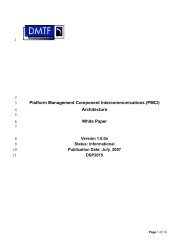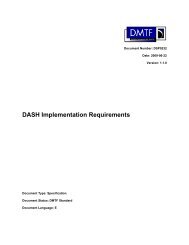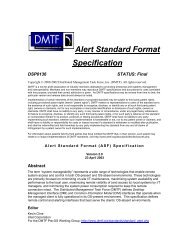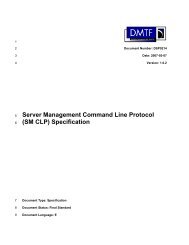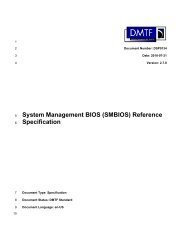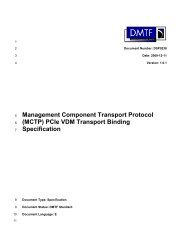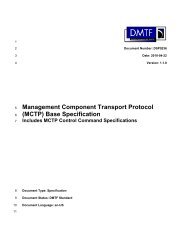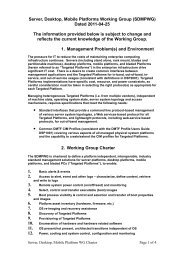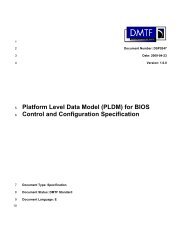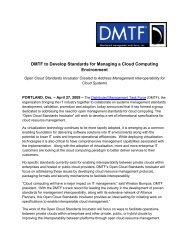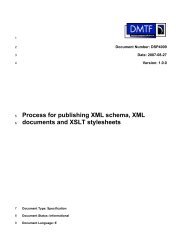DSP0237 - DMTF
DSP0237 - DMTF
DSP0237 - DMTF
Create successful ePaper yourself
Turn your PDF publications into a flip-book with our unique Google optimized e-Paper software.
MCTP SMBus/I2C Transport Binding Specification<br />
<strong>DSP0237</strong><br />
801<br />
802<br />
803<br />
804<br />
805<br />
806<br />
807<br />
808<br />
809<br />
810<br />
811<br />
812<br />
813<br />
814<br />
815<br />
816<br />
817<br />
818<br />
819<br />
820<br />
821<br />
822<br />
823<br />
824<br />
825<br />
826<br />
827<br />
828<br />
829<br />
830<br />
831<br />
832<br />
833<br />
834<br />
835<br />
836<br />
837<br />
838<br />
839<br />
840<br />
841<br />
842<br />
843<br />
6.13.2 Deadlock Avoidance with Fairness Arbitration<br />
A device that wins arbitration but is subsequently NACK'd for its write transaction shall return to waiting<br />
for the FAIR_IDLE period before it can attempt the transaction again.<br />
6.13.3 Fairness Arbitration Support<br />
Bridges and endpoints should support fairness arbitration. An endpoint's support for fairness arbitration<br />
shall be reported through the medium-specific Information field in the response to the Get Endpoint ID<br />
MCTP control message.<br />
6.13.4 Bus Busy Sampling Requirements for Fairness Arbitration<br />
It is atypical and unlikely that the bus will go busy and then free again within T IDLE_WINDOW . This is because<br />
T IDLE_WINDOW is shorter than the time required to send one byte on the bus. Thus, this condition would only<br />
occur on an error or under a usage of the bus that is not legal within the specifications. Therefore, an<br />
implementation is not required to continuously check the bus busy status during the entire duration of<br />
T IDLE_WINDOW (though this is recommended). An implementation is allowed to check the bus busy status<br />
only at the conclusion of the T IDLE_WINDOW interval that is measured by the device.<br />
6.14 Fairness Arbitration Requirements for MCTP Bridges<br />
MCTP bridges that support fairness arbitration shall meet the following requirements:<br />
• The bridge shall support FAIR_IDLE detection and implement the corresponding fairness policy<br />
separately for each port on the bridge.<br />
• Upon device power up or initialization, a port does not need to detect a FAIR_IDLE condition<br />
before first attempting to access the bus.<br />
• A bridge that loses arbitration when attempting to transmit shall continue to retry the transaction<br />
when the bus becomes free for up to PN2 retries (see Table 7). If the retry limit is reached, the<br />
bridge shall drop the packet data.<br />
• A bridge that receives a NACK when attempting to transmit to a given physical address shall<br />
continue to retry the transaction when the bus becomes free for up to PN2 retries. The bridge<br />
will return to attempting to arbitrate for the bus as described in the preceding requirement,<br />
restarting its number of arbitration retries. If the retry limit is reached, the bridge shall drop the<br />
packet data.<br />
• An MCTP bridge shall provide dedicated input buffer space per port. The minimum input buffer<br />
size is large enough to store one full baseline MTU-sized MCTP packet. It is recommended, but<br />
not required, that a bridge also implement a dedicated output buffer per port, sized to store at<br />
least one full baseline MTU-sized MCTP packet.<br />
• If the MCTP bridge is the target of an MCTP packet and it does not have enough buffer space in<br />
its input buffer to store the full packet, it shall NACK the packet. If the bridge has an output<br />
packet to transmit on that same port, it shall be able to issue a START within T START_WINDOW after<br />
issuing the retry NACK.<br />
• A bridge is required to NACK an incoming packet if the bridge does not have input buffer space<br />
available for the packet. For the NACK to be recognized by the transmitter as the NACK for a<br />
packet retry, the first NACK bit shall be issued no earlier than byte two (that is, the Command<br />
Code byte) and no later than byte 8 (the MCTP flags byte). These bytes are represented by the<br />
bold outlined bytes in the Figure 3. After the first NACK has been issued any subsequent bytes<br />
that are received for the packet shall also be NACK'd until a START, STOP, or bus free<br />
condition is detected.<br />
28 <strong>DMTF</strong> Standard Version 1.0.0



